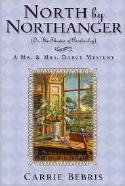This review contains affiliate links, which earn me a small commission when you click and purchase, at no extra cost to you. Thank you for supporting my small business and allowing me to continue providing you a reliable resource for clean book ratings.
When a woman working for the government is recruited for a secret new position that pays much better than her current one, she takes the job. She has no idea what she’s getting herself into and how it will completely upend her life.
In the near future, the British government starts up a new ministry that brings forward several people from the past to see if time travel is truly doable. (Will it have adverse effects on the travelers, short- or long-term? Will it make a wreck of time-space?) It assigns each person a “bridge” to be with them nonstop, help them adjust to their new era, and watch for any signs of trouble.
The bridge who is the narrator of this story is assigned to “1847,” Commander Graham Gore, who was part of Sir John Franklin’s doomed 1845 expedition to the Arctic. He, like the other “expats,” as the Ministry is calling them, was going to die anyway, so bringing him out of his time shouldn’t theoretically be an issue in terms of his being missed.
Our narrator lives with him for a year in an apartment set up and funded by the government, and the first order of business is to get him used to the idea of an unmarried man and woman living together. Then Gore is introduced to technologies (he doesn’t like TV or movies; he does appreciate Spotify) and the very different social mores of the 21st century.
The bridge and Gore slowly get to know each other, and eventually they develop a relationship. And it goes much further than an unusual work dynamic or even friendship.
I am a big fan of time travel stories, so I was definitely interested in reading this novel. It turned out to be quite different from what I may have expected. It’s an unusual mix of genres (time travel, speculative fiction, a bit of romance, some humor, a touch of science fiction, history).
The narrator is half-Cambodian and another bridge is Black, and the story includes lots of rumination on ethnicity and race and the status of those who are and ever have been “other” in Britain. I honestly felt that while the book covers a number of themes, this one stood out to me the most.
I never really felt too connected to the narrator, even though we heard almost the entire story from her first-person point of view. So I wasn’t entirely invested in what happened. I suppose some readers felt some complex emotions at the end of the book, but I wasn’t even sure what I thought. I sat and pondered a bit and read through the author’s note, book club questions, and Q&A with the author. I wanted to get an idea for what she was thinking and what the publisher, perhaps, is intimating the book is “about” through the questions. Those were useful.
I just can’t say I loved the book, though it was… interesting. And I didn’t find it “hilarious,” as some do. (The unnamed questioner in the Q&A says, “While this book tackles many serious issues, including climate change and imperialism, it is outrageously funny.”) I thought a few portions were clever and a touch humorous, but I never laughed out loud, chuckled, etc. Humor certainly is personal. (Bradley answers that question in part with this statement, which I did find to be a nice nugget to chew on: “Nothing is funny unless it touches the quick in some way —laughter being an instinctive, primal gut reaction — so when we’re talking about the things that make us laugh, we are often talking about the things we hold as immediate and personal.”)
Given all that I’ve written here, I suppose The Ministry of Time would make an excellent book club pick (indeed, it was the Good Morning America pick for May). That is, for those who don’t care about profanity and sexual content. This is a solid high rating, however, so I wouldn’t recommend for a club that chooses milder books.
Rated: High. Profanity includes 34 uses of strong language, around 20 instances of moderate profanity, about a dozen uses of mild language, about 40 instances of the name of Deity in vain, and a few uses of British bl- profanity. Sexual content includes kissing, some talk about sex, and a few erotic (“open-door”) scenes. Violence includes a number of scenes of injuries and death, some gory. There are some references to a failed Arctic expedition in which the famished explorers turned cannibals.




